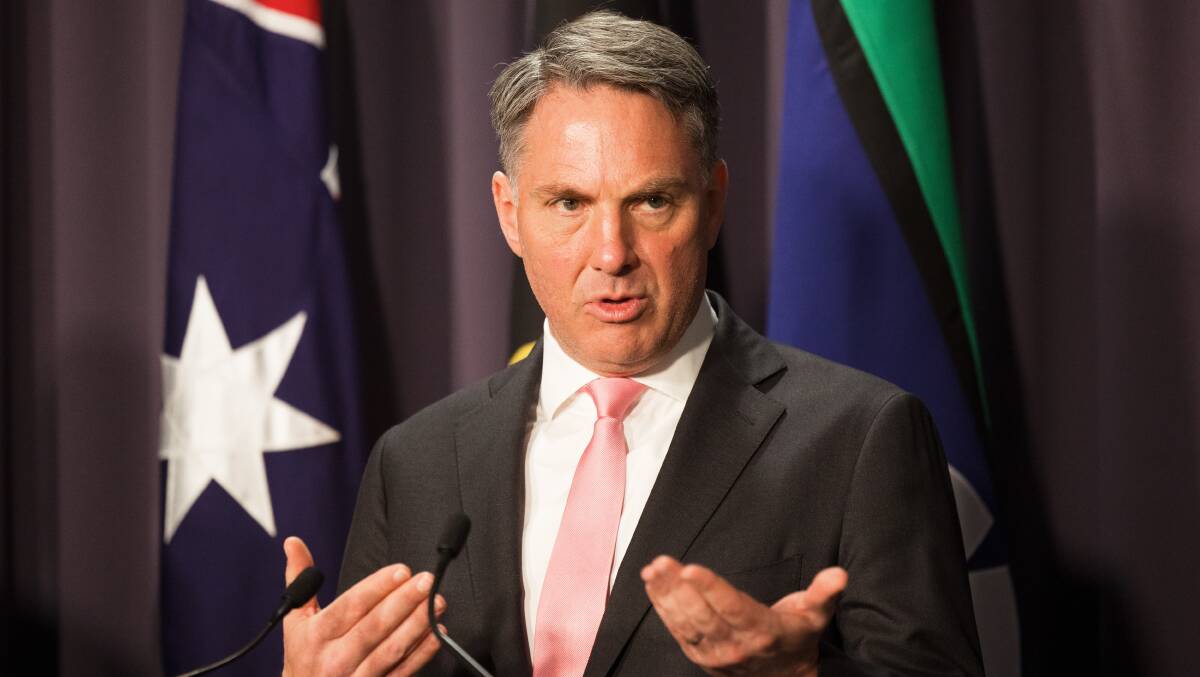This week marks a year since the Morrison government announced the AUKUS arrangement, including Australia's plans to acquire eight nuclear-powered submarines from the United States or Britain.
Subscribe now for unlimited access.
$0/
(min cost $0)
or signup to continue reading
As a group of academics and nuclear policy analysts who continue to have strong reservations about this decision, we call on the Albanese government to rethink this proposal.
There was no discussion of this plan ahead of the announcement and now, more than halfway through an 18-month review process intended to explore how the nuclear-powered submarines would be built, information is still sparse.
The case for the proposed submarines is far from clear, and the Albanese government has not yet dealt with this problem in public-facing debate. Rather than accepting the Morrison government's decision as a fait accompli, it's time the new government tackled the question of whether it makes sense to take Australia down an unprecedented path.
Critics have pointed to several concerns. These include whether nuclear-powered submarines are optimal for defending Australia; a possible loss of independent military action if these are used as part of US war-planning against China; the budget involved (up to $171 billion); the lengthy delivery time; the damage to relationships with our neighbours, especially in south-east Asia and the Pacific Islands; the stress on the nuclear non-proliferation treaty, which is already seen by many non-Western states as highly unequal; the precedent the deal sets for others to follow and the risk this poses to the nuclear non-proliferation regime more broadly.

The issue of the precedent that this sets for an already fragile non-proliferation regime concerns us most. The submarines are projected to use weapons-grade highly enriched uranium.
Transferring any nuclear material to a non-nuclear weapon state for such purposes has never happened before - and for good reason: highly enriched uranium is used to make nuclear bombs.
Australian officials maintain that it would be impossible to divert the HEU in these submarines for nuclear weapons uses, and that in any case, the intention is for the material to be under International Atomic Energy Agency safeguards at all times. Several analysts question these assurances.
They point out that it could be possible to access the highly enriched uranium undetected (although it would be extremely difficult and could be lethal to those involved). They also point out that the naval nuclear propulsion programs of US, Britain, the UK, Russia, China, France, and India are not under International Atomic Energy Agency safeguards, and stress the practical difficulties involved in physically monitoring material on nuclear-powered vessels that are submerged for many months at a time. The agency could well determine that the safeguards challenges are insurmountable. What then?
No one seriously believes that Australia intends to extract highly enriched uranium from submarines to make nuclear weapons. But even if we argue the case that Australia is a responsible state and thus deserves special treatment, it will reinforce the perception of double standards already present in the non-proliferation regime. Australia would incur heavy political costs as a result (and in fact is already facing a political backlash), at a time when we need to build positive partnerships in the region.
There are further problems, too. If Australia creates a precedent by acquiring nuclear-powered submarines, whatever the safeguards arrangements, other non-nuclear weapon states will surely follow. Certain voices in South Korea and Japan have floated the idea. Brazil has already sought a safeguards arrangement with the atomic energy agency for the submarine fuel it is developing indigenously.
Most worryingly, from a non-proliferation perspective, Iran has expressed interest in developing its own capability to produce submarines and their fuel. Many states are technically capable of processing low-enriched or even highly enriched uranium and using it for submarines. If they do, the challenges for safeguards and the potential for diversion to nuclear weapons will multiply.
READ MORE:
Despite these risks and uncertainties, Australian officials have argued that taking highly enriched uranium from the US or Britain and placing it under atomic energy agency safeguards would represent a gain for the nuclear non-proliferation regime. This is because there would then be less unmonitored highly enriched uranium in the world.
But this argument is disingenuous. For one thing, as noted above, there is no guarantee that the International Atomic Energy Agency can conclusively monitor the nuclear material inside any submarine. Moreover, how would transferring highly enriched uranium from a nuclear-weapon state to a state with limited nuclear infrastructure make it safer? It's a curious self-serving argument, and not convincing.
Surely a better way to reduce the amount of unmonitored HEU available globally would be for the nuclear-weapon states to continue to reduce their nuclear weapons stockpiles, as they have promised to do, and to down-blend highly enriched uranium from dismantled warheads to low-enriched uranium for peaceful uses.
Australia claims to support the tight control of fissile material, and for decades we have also been a champion of nuclear non-proliferation and disarmament. Setting a precedent by acquiring nuclear-powered submarines would almost certainly make fissile material control more difficult and tarnish Australia's reputation for non-proliferation excellence.
Acquiring nuclear-powered submarines will bring considerable risks. We need much more public discussion on the cost-benefit calculations involved in the nuclear submarine decision, including its impact on global non-proliferation efforts and on our own national interests.
- Trevor Findlay is a principal fellow at University of Melbourne and a member of the Asia-Pacific Leadership Network; Marianne Hanson is an associate professor at the University of Queensland and a member of the Asia-Pacific Leadership Network; Tanya Ogilvie-White is a senior research adviser with the Asia-Pacific Leadership Network; Maria Rost Rublee is an associate professor at Monash University; Jingdong Yuan is an associate professor at the University of Sydney; and Benjamin Zala is a fellow and senior lecturer at the Australian National University.

